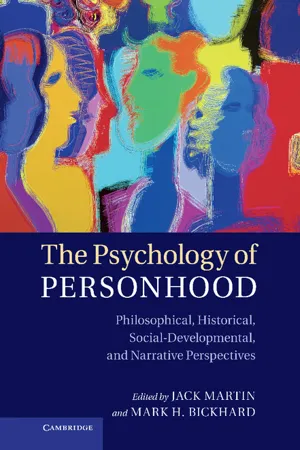
The Psychology of Personhood
Philosophical, Historical, Social-Developmental, and Narrative Perspectives
- English
- PDF
- Available on iOS & Android
The Psychology of Personhood
Philosophical, Historical, Social-Developmental, and Narrative Perspectives
About this book
What is a person? Surprisingly little attention is given to this question in psychology. For much of the past century, psychology has tended to focus on the systematic study of processes rather than on the persons who enact and embody them. In contrast to the reductionist picture of much mainstream theorising, which construes persons as their mental lives, behaviours or neurophysiological particulars, The Psychology of Personhood presents persons as irreducibly embodied and socially situated beings. Placing the study of persons at the centre of psychology, this book presents novel insights on the typical, everyday actions and experiences of persons in relation to each other and to the broader society and culture. Leading scholars from diverse academic disciplines paint an integrative portrait of the psychological person within evolutionary, historical, cultural, developmental and everyday contexts.
Frequently asked questions
- Essential is ideal for learners and professionals who enjoy exploring a wide range of subjects. Access the Essential Library with 800,000+ trusted titles and best-sellers across business, personal growth, and the humanities. Includes unlimited reading time and Standard Read Aloud voice.
- Complete: Perfect for advanced learners and researchers needing full, unrestricted access. Unlock 1.4M+ books across hundreds of subjects, including academic and specialized titles. The Complete Plan also includes advanced features like Premium Read Aloud and Research Assistant.
Please note we cannot support devices running on iOS 13 and Android 7 or earlier. Learn more about using the app.
Information
Table of contents
- Contents
- Contributors
- 1 Introducing persons and the psychology of personhood
- Part I Philosophical, conceptual perspectives
- Part II Historical perspectives
- Part III Social-developmental perspectives
- Part IV Narrative perspectives
- Bibliography
- Index